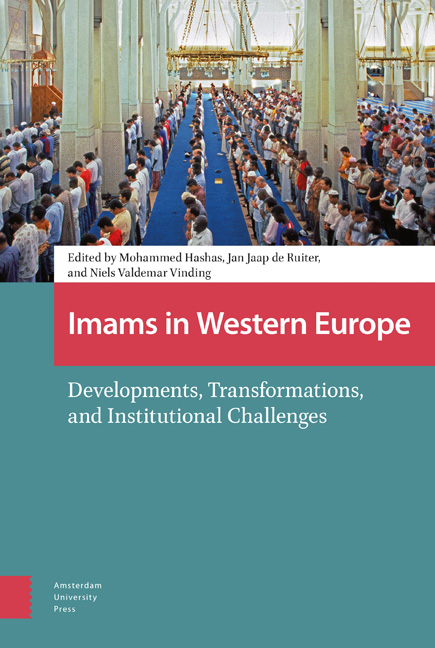6 - Imam Training in Europe: Changes and Challenges
Published online by Cambridge University Press: 06 January 2021
Summary
Abstract
This chapter examines the various religious trends in European Islam by identifying examples of leadership and highlighting areas where trends interact to construct a training agenda for imams. It highlights the schematized training spaces that intellectually nourish the individual beliefs of particular citizens of Muslim faith, who are considered sources of future Muslim discursive practices. These discursive practices, in turn, can be considered tools for future religious leaders who seek to reconstruct the dominant Islamic discourse in Europe. Several major intertwining elements are studied in this chapter: mosques, imams, space and identity dynamics, actors of Islam and the construction of leadership, the formation of authority in European Islam, and the training of imams in Europe.
Keywords: Muslim citizenship, fiqh of contextualities, fiqh of priorities, religious authority, fragmentation of authority
Introduction
What do imams preach in their sermons? How can we fight religious radicalization? How can we develop an environmentally friendly Islam of modernity that is in line with existing constitutions? How can we deal with Muslim countries without running the risk of political interference into the fabric of their faithful subjects? How can we achieve an aggiornamento of Islam for and by Muslims? (Arkoun, 2012). Each of these questions is likely to provoke different policies and inspire observers, institutional Muslims, and the stakeholders who are directly involved in the training of imams, to weigh the political and sociological paradigms suggested for understanding European Islams and to plan the construction of a single Islamic agenda congruent with Western democracy (Abou El Fadl, 2004; Dassetto, 1996).
Viewed in all of its complexity, the Gordian knot of the debate about Islam in Europe remains an issue of philosophical, theological, and epistemological order. Training religious leaders in Europe is almost analogous to directly touching the construction of a semiotics of faith, which involves considering the selection of methodologies, the choice of scientific disciplines, and the filtering of theological currents. In other words, the project consists of a certain degree of interference into the religious mechanisms that (re)define the European representations of Islam's overall future function. It goes without saying that the persistent need of an urgent functional effect in the present implies that the various actors involved in the project of training imams are not always aware of the scope of their interference into the future.
- Type
- Chapter
- Information
- Imams in Western EuropeDevelopments, Transformations, and Institutional Challenges, pp. 101 - 120Publisher: Amsterdam University PressPrint publication year: 2018
- 1
- Cited by



